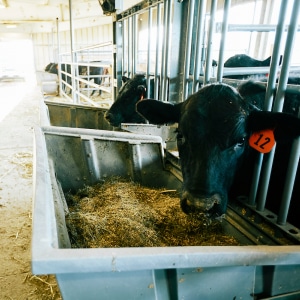BOZEMAN — The Steer-A-Year program in Montana State University’s College of Agriculture will return for the 2025-26 academic year and is seeking donations of young cattle and feed.
Housed in the Department of Animal and Range Sciences, Steer-A-Year combines academic courses with hands-on experience, exposing students to the many aspects of raising cattle. Students spend the year feeding, caring for and managing steers while also collecting data on feed efficiency and weight gain and studying livestock marketing.
For many students, the program is the first time they have had direct contact with cattle, making it a hugely beneficial opportunity, said program adviser Hannah DelCurto-Wyffels.
“Steer-A-Year has now been providing life-changing educational opportunities at MSU for more than a decade,” she said. “It helps students prepare for their careers in tangible and applicable ways, in an environment that is supportive, engaging and approachable. We would not have been able to experience this kind of longevity as a program without the incredible donors and supporters who provide donations each year.”
Steer-A-Year accepts financial support or donations of steers, feed and other supplies. Donated steers are housed at the Bozeman Agriculture Research and Teaching Farm, and at the end of the academic year, the cattle are sold to MSU Culinary Services. The meat is served in both of MSU’s award-winning dining halls, Miller and Rendezvous, helping to fulfill the university’s commitment to using as many local ingredients as possible. Last year, Culinary Services purchased all 45 cattle raised by Steer-A-Year students.
Proceeds from those sales support travel and other costs for student teams and clubs in the College of Agriculture, including to meetings with commodity groups and industry professionals, which DelCurto-Wyffels said allows for even more career networking and learning opportunities.
“Steer-A-Year helps our students gain literacy in every element of animal science while they engage with producers and professionals all over Montana,” she said. “Industry partners never fail to amaze us with their generosity and willingness to mentor the next generation of agricultural professionals, and we hope that learning process continues to go both ways.”
Annual awards are given to the producer who donated the best initial feeder steer, the steer with the top rate of gain, the steer with the best feed efficiency and the steer that produces the best carcass.
DelCurto-Wyffels said that calves should be weaned, castrated and dehorned before donation and should weigh between 500 and 800 pounds. The ideal pickup period for calves is the first two weeks of November. Those interested in donating steers or feed, providing financial support or learning more about the Steer-A-Year program can contact DelCurto-Wyffels at 406-994-3752 or hannah.delcurto@montana.edu.
###
MSU News Service


